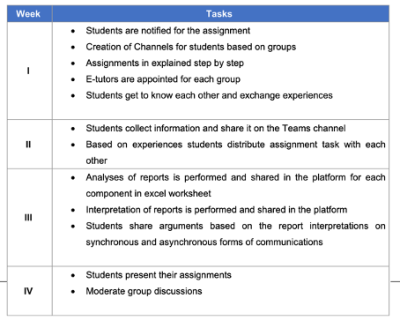Sidebar
Table of Contents
General
The European University of Tirana offered a VCL course as part of its MA level Advanced Financial Analyses and Reporting Course in the winter semester of 2021. The course focuses on analyzing financial statements of a company from a specific sector, using indicators like profitability, liquidity, asset utilization, and solvency in a report. The report covers various sections, including an introduction to the company, financial analyses, market and information analyses, and investment decisions.
Task
In this VCL project, students had to analyze companies in specific sectors based on the latest reports from the “National Business Center”. This is done to improve strategic management and achieve economic goals in a competitive market environment. The analysis uses financial reports and other information to identify indicators of company performance. Bhunia et al. (2011) emphasize that these indicators are closely related and must be considered together.
For practice, student groups chose an integrated financial analysis topic from the banking, manufacturing, or construction sectors. The workload was divided among various aspects of the analysis, including gross and net profit margins, working capital, liquidity ratios, debt, inventory turnover, total inventory turnover, return on equity, return on assets, operating cash flow, and seasonality.
Course Structure
Assessment of the Students
Assessment for the course includes active participation in seminars, course assignments, and a final exam. The VCL module was adapted for the course assignment part, which accounts for 20% of the total grade.
Monitoring is an essential aspect of the evaluation process. Monitoring is essentially an on-going process to ensure that the learning process is on track, and that the pace and content of the learning remain relevant to students.
E-tutors played an important part in the monitoring of the progress of the VCL Course. They were the first point of contact with the students. For main issues had frequents questions and answers sessions.
Student assignments
Monitoring is an essential aspect of the evaluation process. Monitoring is essentially an on-going process to ensure that the learning process is on track, and that the pace and content of the learning remain relevant to students.
E-tutors played an important part in the monitoring of the progress of the VCL Course. They were the first point of contact with the students. For main issues had frequents questions and answers sessions.
At the end students submitted on the UET Learning Management System (LMS) a comprehensive 7000- 1000 words report regarding the company which comprised the fowling sections: Introduction to the company, Financial Analyses, Market and Info analyses, Decision Investment.
Students Feedback
IT tools and reports were the main source of monitoring student activities, where Surveys were used to collect student expectations before and feedback after the module, the following results were obtained:
- Majority of the students is full-time employed and so the online learning is time-saving and easier to adapt to their schedules,
- Almost none of them had prior experience with VCL, so Albanian-language resources would be beneficial,
- Half of the students answered that this way of learning strengthens the relationship with teachers. Students were familiar with the platform and online communication due to the pandemic but nearly 80% found group work more transparent and efficient through VCL.
- About 50% of the students found this an interesting way to have an international experience “at home”, meanwhile 45% answered that this would not be enough to enjoy the full experience of an international mobility.
Recommendations
VCL courses are more effective in group learning and teamwork than the traditional way of teaching and learning and should therefore be integrated into more courses. Virtual collaborative learning combines interactive learning and technology-driven flexibility but requires deliberate attention to participant interaction. VCL settings require detailed and systematic preparation of the learning experience, as well as an explicit definition of the learning objectives. VCL requires the active role of learners and strong guidance of students.

